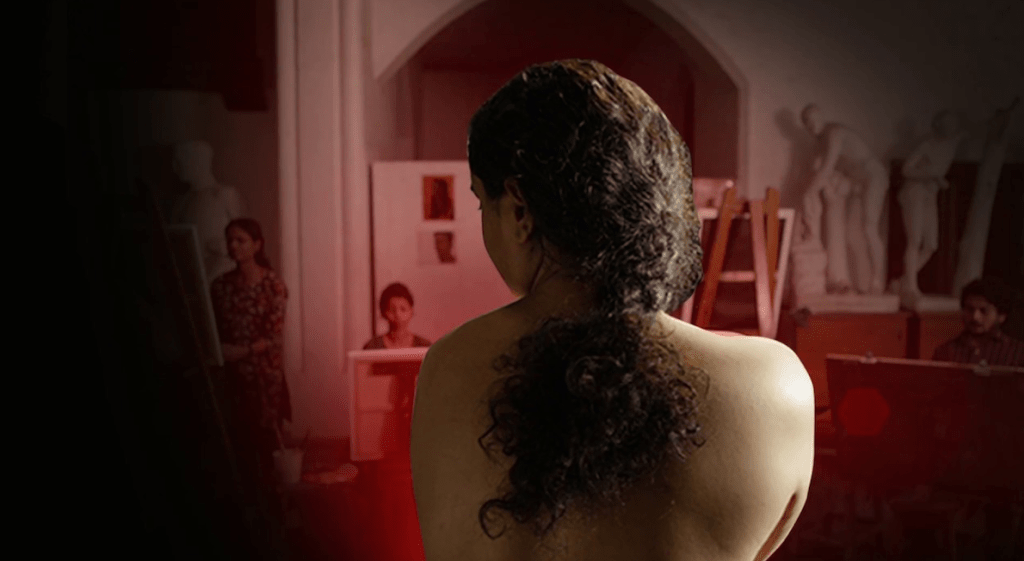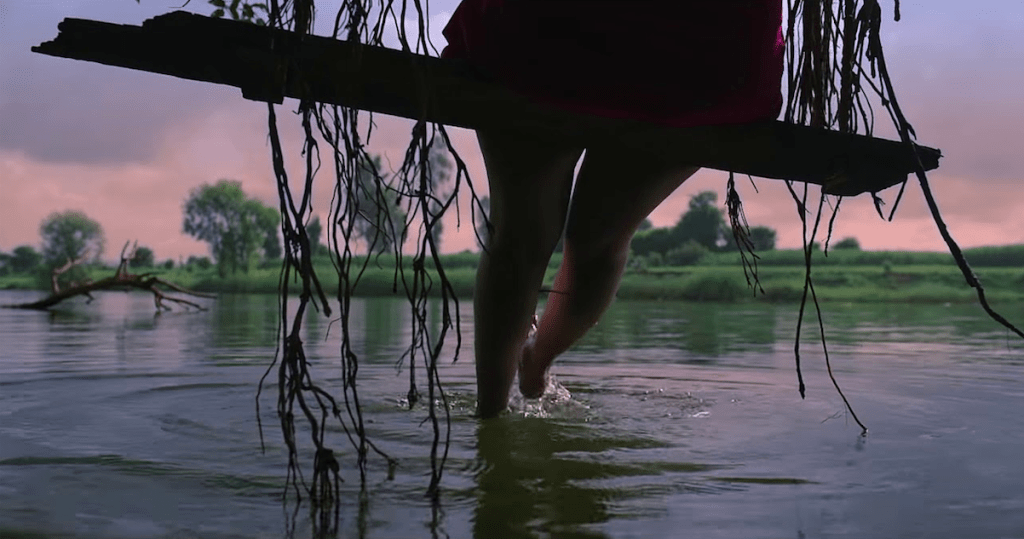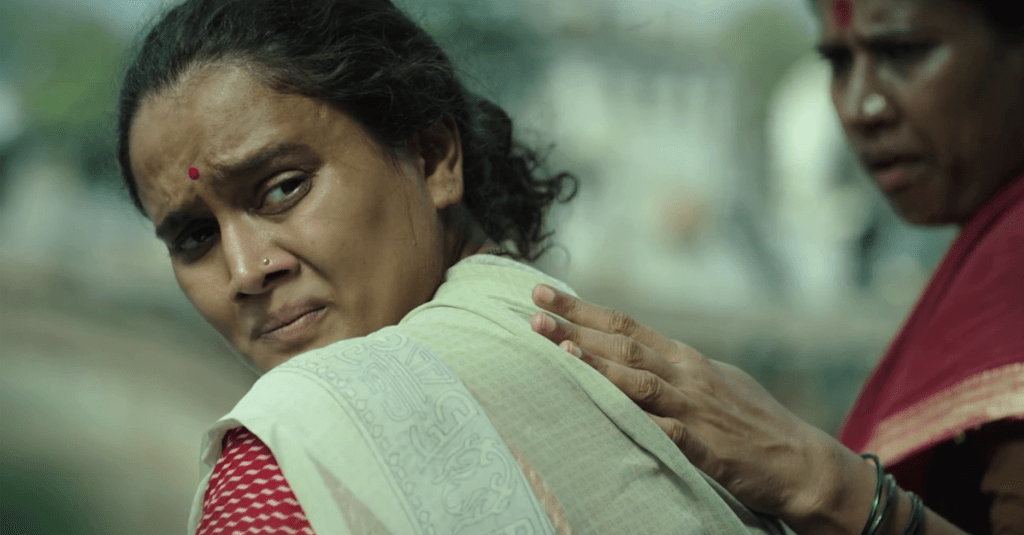18th Annual NEW YORK INDIAN FILM FESTIVAL
May 7-12, 2018
REVIEWS
|
vaguevisages.com
New York Indian Film Festival Review: Ravi Jadhav’s ‘Nude’
Bedatri Datta Choudhury
May 7, 2018
|
| |
 |
| |
In 2017, the Indian Panorama section of the International Film Festival of India was meant to open with Ravi Jadhav’s Marathi language film, Nude, but the program was changed at the last minute with the organizers providing no clarifications. When one watches Jadhav’s film about the journey of Yamuna — who takes to nude modeling for art students, in order to support her family — one can see why. In typical popular cinema terms, a naked or a near-naked woman is only meant to serve as an agent of titillation in an item song or sex scene, or to be correlated with a rape victim. When a woman like Yamuna (played by Kalyanee Mulay) takes her clothes off on her own accord and decides to not gyrate or rub herself against a pole, she creates somewhat of a sticky situation within the audience’s psyche. Yamuna, though nervous and scared in the beginning, evolves to be unabashed in her nakedness, unashamed at the exposure and celebratory of the freedom her profession brings her. For the Government of India’s Ministry of Information and Broadcasting, she poses a strange problem, and they have no idea how to go about solving a problem like Yamuna.
Yamuna runs away from an abusive and cheating husband with her son, Lakshman (Madan Deodhar), and arrives in Mumbai looking for work. She lives with her aunt — who she calls “Akka” (Chhaya Kadam) — and when she follows her to the art college where she claims to work as a sweeper, she finds out that her Akka is a nude model for students of the school. It is a dying profession both because women are gradually refusing to do it, and because of the rise of conservative, right wing politics which takes a moral issue with female nudity and deems it obscene. Akka tells her niece that there is absolutely no shame in helping further the education of students, that she feels proud of her profession because it helps her earn her daily bread and run her family single-handedly. In a moving scene, Yamuna finally decides to be a model, and Akka smears a little kohl behind her ear — something the elders in the family do to protect someone from an evil eye. The profession then becomes somewhat of a legacy, an heirloom that Akka hands down to Yamuna. Their profession is a secret they share, because it’s something that lies beyond the comprehension of the men in their lives. Not only do Akka’s husband and Yamuna’s son lack the sensitivity to understand the need for such a career, but they also are completely unable to picture a naked woman as anything other than a sexual object.
|
 |
| |
Within the course of the film, what emerges beautifully is the story of the soulful kinship between Akka and Yamuna; Akka draws Yamuna a big red bindi — a “Stop!” for all the men who will want to hit on her — and Yamuna buys her a sari. When the two sit with their backs to each other, in the middle of a sketching session, they talk in whispers: “The electricity bill was so high this month, your son shouldn’t have the fan on all the time.” “We should spend less on detergent, because who cares about our clothes anyway?” Within a classroom charged with the male artists’ gaze of the female form, there emerges a sisterhood serving the purpose of art but belonging to a part of society situated light years away from the glitz of galleries. The film is obviously a comment on class, but also on the ways in which art continues to alienate classes of people belonging to the lower economic stratas of the society; classes of people who sweep the floors of art colleges, and classes of men and women who shed their inhibitions, bare their bodies, just so students know how best to draw the perfect curve of the human body.
‘English Vinglish’ is directed by Gauri Shinde, who says, “It is inspired by my mother whose discomfort with the English language did not stop her from realizing her full potential as a human being, a mother, a wife and a professional. It is my way of saying ‘sorry’ and ‘thank you’ to my mother and a tribute to women.”
Mulay — with her curly hair, deep eyes and wide forehead — looks like a painting herself, and Jadhav’s portrayal of her character’s arc is just as beautiful. The model who starts out crying out of shame on her first day (crouching, bending and holding her arm across her breasts), eventually becomes a self-assured woman who sits straight with her arms flanked on either side. Finally, she becomes the matriarch, the Akka-figure, who initiates younger women into the profession. Kadam, with her kohl-lined eyes and large red bindi, looks like she has stepped right out of a Thota Vaikuntam painting. With her perfectly measured proportions of love and strictness, sensitivity and impatience — and above all, a zest to live life on her own terms — Kadam as Akka is a revelation. When she walks in her nauvari saree, with her sandals flopping against the ungiving roads of Mumbai, you know she is a committed survivor, one who shouts, kicks, screams her way through life.
|
 |
| |
Within India’s ever-rising conservative right-wing politics that opposes everything remotely progressive, funding for the arts or the general freedom of expression through art has taken a beating. In choosing to base the character of a famous artist (played by Naseeruddin Shah) on the legendary M.F. Husain, who was driven to a point of self-exile after Indian right wing groups attacked him for painting Hindu goddesses in the nude, Jadhav centers the conversation around censorship. The not-so-subtle nod to Husain acts as a reminder that even nearly 10 years after his 2011 death, India’s problem of art censorship has only gotten much worse. Nude is a caveat to our times; a warning that we are driving arts education to a point of redundancy with our politics, and a reminder that it is for the efforts of women like Yamuna that there still continues to be a small resistance that withstands the pressure to conform to the society’s arbitrary standards of propriety and obscenity.
At a political juncture when Bollywood can pretty much be considered spineless and rather toothless when it comes to standing against an unfavourable government, Nude, emerging from western-Indian regional Maharashtrian cinema, is a beacon of radical hope. By making this film, Jadhav not only digs a deeper niche for the politics of cinema that he represents, but he also pays homage to a certain class of working women, whose work often goes unnoticed. He creates a subaltern history for the thousands of women whose names may not resound like that of the Vivienne Westwoods or the Victorine Meurents, but women without whom arts education would perhaps remain incomplete.
Nude is the opening film at the 2018 New York Indian Film Festival (May 7-12).
Bedatri Datta Choudhury (@Bedatri) grew up in India and has studied Literature and Cinema at the University of Delhi, Jawaharlal Nehru University and New York University. She moonlights as a writer and likes writing on films, gender and culture. She lives in New York City and loves eating cake.
|
| |
| URL: https://vaguevisages.com/2018/05/07/new-york-indian-film-festival-review-ravi-jadhavs-nude/ |
| |
|
|
|

